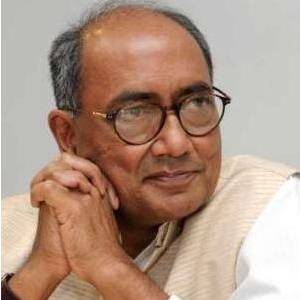
New Delhi, December 21: Senior Congress leader Digvijay Singh was granted bail by a Delhi court on Friday in connection with a criminal defamation case filed against him by BJP President Nitin Gadkari.
Mr. Singh appeared before Metropolitan Magistrate Sudesh Kumar in pursuance to the summons issued against him by the court on November 17 and the judge granted bail to him on a personal bond of Rs 50,000 and a surety of the like amount.
Outside the court, Mr. Singh told reporters that he will now prove all his charges against Mr. Gadkari.
“Now I can say everything in front of the court the way Mr. Gadkari has worked as a businessman and how he has links with various other businessmen, which all companies of his were fake and how he earned profits,” he said.
The court after finding “prima facie” evidence against Mr. Singh had directed him to appear before it to face trial for the offence punishable under section 499 (defamation) and 500 (punishment for defamation) of the IPC.
The defamation case was filed by Mr. Gadkari against the Congress general secretary who had allegedly accused him of having business links with his party MP Ajay Sancheti.
It was also alleged in the complaint that Mr. Singh accused Mr. Gadkari of pocketing huge sum to the tune of Rs 490 crore in the coal block allocation to Mr. Sancheti.
Mr. Gadkari, in his statement recorded in the court, had denied having any business ties with Mr. Sancheti and had said Mr. Singh levelled “totally false and defamatory” allegations against him to “give the impression that I have been responsible for allocation of the coal mines” to Mr. Sancheti.
The BJP leader, in his petition filed through advocate Ajay Digpaul, had sought Mr. Singh’s prosecution under sections 499 and 500 of the IPC.
The court had also said Mr. Singh will have the opportunity to put his defence during the trial.
In his petition, Mr. Gadkari had alleged that Mr. Singh had levelled defamatory allegations against him to lower his dignity in the public at large and it was made with wrongful intent to malign and tarnish his image.
“I am grateful to Mr. Gadkari for giving me the opportunity to say in court what I had said before the press,” Mr. Singh said.
“I stick to my comments (regarding Mr. Gadkari). I just need to do more research,” he said.
The Congress leader also said, “My aim is to highlight what BJP is upto while it says it’s fighting against corruption”, adding that he has no “personal ill will” towards Mr. Gadkari.
The court has slated the matter for further proceedings on January 31.
Earlier, Mr. Gadkari had said that Mr. Singh had deliberately projected him as a business partner of Mr. Sancheti with whom he has neither any links nor did he receive any benefit from him.
In his complaint, Mr. Gadkari has said the Congress-led UPA government is facing a lot of heat on account of its irregularities as brought out by the Comptroller and Auditor General of India (CAG) in coal blocks allocation and accused Mr. Singh of making baseless allegations against him to divert attention from the issue.
The court on October 16 had reserved its order on the complaint after recording statements of two witnesses - Gadkari and BJP National Secretary Bhupinder Yadav, also a Rajya Sabha MP.
In his statement to the court, Mr. Yadav had said on September 3, he read news articles in various newspapers about the alleged business relations between Mr. Gadkari and Mr. Sancheti and it was “totally false” that Mr. Gadkari had earned Rs 490 crore from coal allocation through Mr. Sancheti.
Mr. Yadav had also said the news was “defamatory“.
The court had also recorded the statement of an authorised representative of a national English daily in which the alleged defamatory statement of Mr. Singh was published.





Comments
Add new comment